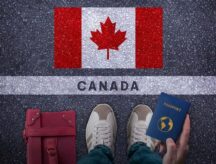Can I be a dual citizen if I immigrate to Canada?
Although they eventually become Canadian citizens many immigrants to this country aim to obtain dual citizenship to maintain the benefits of being a citizen in their home country.
What is dual citizenship?
Dual citizenship occurs when someone legally holds two different passports simultaneously. When this happens, the individual holds the legal status of a citizen in both their home country as well as Canada.
Schedule a Free Canadian Citizenship Consultation with the Cohen Immigration Law Firm
Note: Dual citizens must always abide by the laws specific to whichever country of citizenship the person resides in at that time.
Dual Citizenship: Pros and Cons
There may be many reasons that Canadian immigrants want to maintain dual citizenship after becoming a citizen of Canada. These include:
- The ability to hold two passports simultaneously
- The ability to maintain eligibility for (and access to) the rights and programs* available to citizens of both countries
- Simplified travel between both countries where an individual is a citizen (this often also includes any relevant allied countries)
*Examples may include the ability to access Canada’s social programs – some of which are only available to citizens – and the ability to own property in either country
On the other hand, there are some things to consider before becoming a dual citizen. For instance, in certain cases, dual citizens may be obligated to abide by taxation rules in both countries simultaneously, meaning that they may need to pay taxes more than once. Additionally, other obligations in one country (military service etc.) may further complicate the new life an immigrant is trying to build in Canada.
Can I be a dual citizen?
An immigrant’s ability to be a dual citizen depends primarily on the rules and regulations established by their home country’s government.
In other words, although Canada allows foreign nationals to maintain their original citizenship when obtaining citizenship here, Canadian immigrants may only become dual citizens if their country of origin also allows it.
Therefore, immigrants who eventually seek Canadian citizenship are advised to first consult the rules and regulations of their home country to fully understand what will happen to their current citizenship status if they become Canadian citizens.
The list below outlines whether an immigrant from each of Canada’s top 10 new permanent resident (PR) source countries can maintain dual citizenship if they later decide to apply to become a Canadian citizen.
India
Canadian immigrants from India cannot hold dual citizenship when they become citizens of Canada. In fact, according to the Indian government, applying for Indian citizenship once becoming a citizen of a foreign country or continuing to hold/obtain an Indian passport is by law a punishable offence.
Indian nationals who obtain Canadian citizenship, however, may pursue an Overseas Citizen of India (OCI) designation.
United States of America (USA)
The USA permits dual citizenship for American nationals who become Canadian citizens. This means that citizens of the US can pursue Canadian citizenship without having to worry about any impact it may have on their status as a citizen south of the border.
China
Canadian immigrants from China cannot hold dual citizenship because this type of citizenship is not legally recognized in China.
According to a Government of Canada travel advisory last updated in July 2024, this means that China may refuse to provide Canadian travellers with access to Canadian consular services abroad “if [they] consider you a citizen of China.”
Therefore, the Canadian government advises Chinese nationals to always travel to China with a valid Canadian passport and take care to always “present [themselves] as a Canadian to foreign authorities at all times.”
Philippines
Canadian citizens who immigrated from the Philippines are permitted by local authorities to maintain dual citizenship.
This means that Filipino-born Canadian citizens who were born before 1973 may apply to retain or regain their local citizenship if they had at least one Filipino parent when they were born.
Note: Canadian-born individuals who had at least one Filipino parent at the time of their birth are already considered dual citizens of Canada and the Philippines.
Afghanistan
Dual citizenship is not legally recognized in Afghanistan.
This means that, as is the case in China, Afghan government officials who consider a Canadian citizen travelling there to be a citizen of Afghanistan may refuse the traveller access to Canadian consular services.
Nigeria
Nigerian-born immigrants who later become Canadian citizens can maintain dual citizenship.
However, the Nigerian government would not allow Canadian citizens to also later become naturalized in Nigeria.
Pakistan
Pakistan is another country that does not recognize dual citizenship.
Although Pakistan has a dual citizenship agreement in place with Canada, Canadian citizens are free to pursue citizenship in Pakistan but any Pakistani-born immigrants who obtain Canadian citizenship must revoke their home country citizenship at that time.
Cameroon
Cameroon does not legally recognize dual Canadian-Cameroonian citizens. Similar to China and Afghanistan, this means that Cameroonian government officials may refuse to provide access to Canadian consular services when abroad if they consider the individual to be a citizen of Cameroon.
Iran
Individuals who obtain Canadian citizenship after immigrating from Iran cannot hold dual citizenship. This is because dual citizenship is not legally recognized in Iran.
While this may also lead to the refusal of access to Canadian consular services for travellers deemed to be Iranian citizens by local authorities, the Canadian government also advises that “Canadian-Iranian [citizens] must [ensure they] enter and exit Iran using [their] Iranian passport.”
The Canadian government additionally cautions that Canadian citizens travelling to Iran may not be permitted to leave unless they meet certain conditions.
Eritrea
Dual citizenship is not legally recognized in Eritrea.
This means that, as is the case with several other countries on this list, Canadian citizens travelling to this country may be denied access to Canadian consular services if local authorities consider them to be citizens of Eritrea.
Schedule a Free Canadian Citizenship Consultation with the Cohen Immigration Law Firm
- Do you need Canadian immigration assistance? Contact the Contact Cohen Immigration Law firm by completing our form
- Send us your feedback or your non-legal assistance questions by emailing us at media@canadavisa.com






